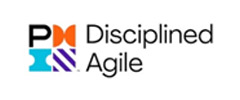Disciplined Agile Foundations of Agile
| Start Date | End Date | Country | City | Days | Price | |
| No Event date Found |
This workshop is delivered in a virtual (online) instructor-led format. It takes place over two days with approximately 3.5 hours training each day.
Timings are: 12:30 – 16:00 BST | 13:30 – 17:00 CEST | 17:00 – 20.30 IST

DESCRIPTION:
Ever wonder what it is like to work on an Agile team? Sure, on the surface Agile looks simple and straightforward. In practice, though, when we start adopting an Agile way of working, reality quickly proves to be much more complex than expected. This module teaches you the foundation for successfully starting an Agile way of working inside your team.
During this course, we will show you how to:
- Apply an iterative way of working inside your team
- Describe the artifacts, roles and ceremonies of an iterative way of working
- Utilize a work board and information radiator
- Write user stories and estimate them
- Gather requirements in a collaborative way
Audience
This module is not technical and is recommended for all team members new to Agile. Games, simulations and group discussions reinforce the practices learned.
Prerequisites
- Delegates to purchase and use during the workshop: Choose Your WoW!: A Disciplined Agile Delivery Handbook for Optimizing Your Way of Working (WoW) – Jan 1 2019 by Scott Ambler & Mark Lines
Benefits
- Attendees earn the designation of Disciplined Agilist, with free first year membership and full benefits, a $50 US value
PMI PDU POINTS:

See how to claim PMI PDU's
ABOUT DISCIPLINED AGILE (DA)
Disciplined Agile (DA) is a process-decision toolkit that provides straightforward guidance to help people, teams, and organizations to streamline their processes in a context-sensitive manner.
DA provides a solid foundation for business agility by showing how the various activities such as Solution Delivery (software development), IT Operations, Enterprise Architecture, Portfolio Management, Security, Finance, Procurement, and many others work together. DA also describes what these activities should address, provides a range of options for doing so, and describes the trade-offs associated with each option.
Four views:
1.Mindset. Builds on the foundations of agile and lean to address enterprise realities.
2.People. Roles, responsibilities, and team structures.
3.Flow. This captures the dynamic aspects of processes via lifecycle diagrams and workflow diagrams.
4.Practices. Small strategies/techniques. Goal diagrams are a high-level pick list of practices.
AGENDA
1. The big agile picture
2. Planning the first iteration
3. Running the first iteration
a) Information radiator
b) Agile team roles
c) Agile ceremonies
4. Demonstration and retrospective of the first iteration
5. Planning the second iteration
6. Running the second iteration
a) User stories and estimation
b) Test-first approach
c) Dealing with change
7. Demonstration of second iteration
8. Retrospective of the module
Workshop Logistics:
Topics:
- Primary: Agile
- Secondary: agile, fundamentals, interactions, retrospectives
Level: Introductory
Duration: Two half days (each 3.5 hours) – Total 7 hours of online instructor-led workshop
THE TRAINER

Rajshekhar Chittoory
Lean-Kanban-Agile Transformation Consultant, Coach & Trainer
Rajshekhar is an experienced Lean-Kanban-Agile transformation consultant, coach and a trainer. He has worked with small, medium and large-scale organisations to adopt Agile and help his clients to build capabilities to sustain their Agile and Kanban-Lean adoption. Rajshekhar has an IT experience of 20+ years. He has significant experience in Lean-Kanban-Agile implementation in domains like software, construction, operations, marketing, supply-chain and manufacturing. He is an acknowledged industry expert in Systems Thinking. As part of his consulting, coaching and training practice, Rajshekhar has travelled globally. Rajshekhar is an AKT(Accredited Kanban Trainer), SPC4.0(SAFe Program Consultant), Certified Disciplined Agile Instructor (CDAI) by PMI, PMI-ACP, PMP, PMI-RMP, PMI-PBA, ITIL, CSM and CSP.
Submit your details to download the brochure:
Coming Soon.


